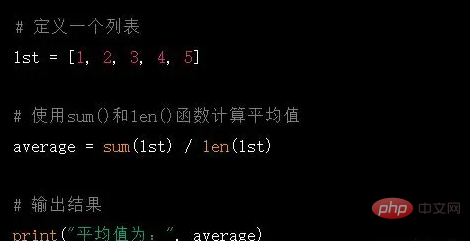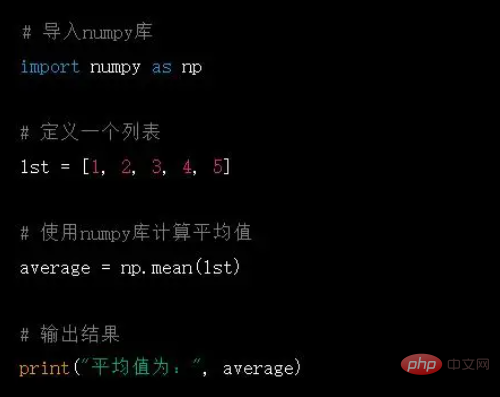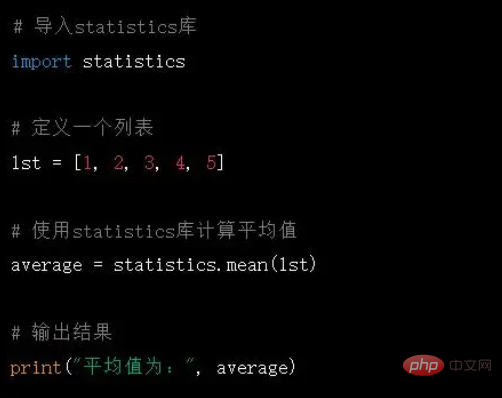Home >Common Problem >What is the code for averaging in python
What is the code for averaging in python
- zbtOriginal
- 2023-08-16 14:56:0213688browse
Python’s code for averaging is the sum() and len() functions, numpy code and statistics code. 1. Sum() and len() functions, define a list, use sum() and len() functions to calculate the average, and output the result; 2. numpy library code, import the numpy library, define a list, and use the numpy library Calculate the average and output the result; 3. Statistics library code, import the statistics library, define a list, etc.

The operating environment of this tutorial: windows10 system, python version 3.11, DELL G3 computer.
Python is an easy-to-learn programming language that provides a wealth of libraries and functions that make writing code easier and more efficient. In Python, averaging can be achieved with a few simple lines of code.
Method 1: Use sum() and len() functions

This is one of the most common methods, which uses Python's built-in sum() function and len() function, the code is as follows:
# 定义一个列表
lst = [1, 2, 3, 4, 5]
# 使用sum()和len()函数计算平均值
average = sum(lst) / len(lst)
# 输出结果
print("平均值为:", average)The above code will output the average value: 3.0
Method 2: Use the numpy library
Numpy is an important scientific computing library in Python. It provides a set of efficient mathematical functions that can easily perform various numerical calculations.

Use numpy library code
Use numpy library to calculate the average, the code is as follows:
# 导入numpy库
import numpy as np
# 定义一个列表
lst = [1, 2, 3, 4, 5]
# 使用numpy库计算平均值
average = np.mean(lst)
# 输出结果
print("平均值为:", average)The above code will output the average as: 3.0
Method 3: Use the statistics library
Python’s statistics library is a standard library for mathematical statistics. It provides a set of commonly used statistical functions, such as Mean, median, variance, etc.

Use statistics library code
Use statistics library to calculate the average value, the code is as follows:
# 导入statistics库
import statistics
# 定义一个列表
lst = [1, 2, 3, 4, 5]
# 使用statistics库计算平均值
average = statistics.mean(lst)
# 输出结果
print("平均值为:", average)The above code will output the average value as: 3.0
Let us analyze this code line by line:
1. First, we use the input function to receive a set of numbers entered by the user and save it in the variable numbers.
2. Next, we use the split function to separate the numbers string into a list by spaces. We then use a list comprehension to convert each element in the list to a floating point number and save it in numbers_list.
3. Then, we use the sum function to sum all the elements in numbers_list, and use the len function to calculate the length of the list, that is, the number of numbers.
4. Finally, we divide the summation result by the number of numbers to get the average value and save it in the variable average.
5. Finally, we use the print function to output the results.
This code can find the average of any number of numbers. The user simply enters a set of numbers, separated by spaces, and the program automatically calculates the average and outputs the result.
To sum up, the code for averaging in Python is very concise and easy to understand. We can easily achieve this by using built-in functions and list comprehensions. Python is a very convenient and powerful tool for both beginners and experienced developers. .
The above is the detailed content of What is the code for averaging in python. For more information, please follow other related articles on the PHP Chinese website!

